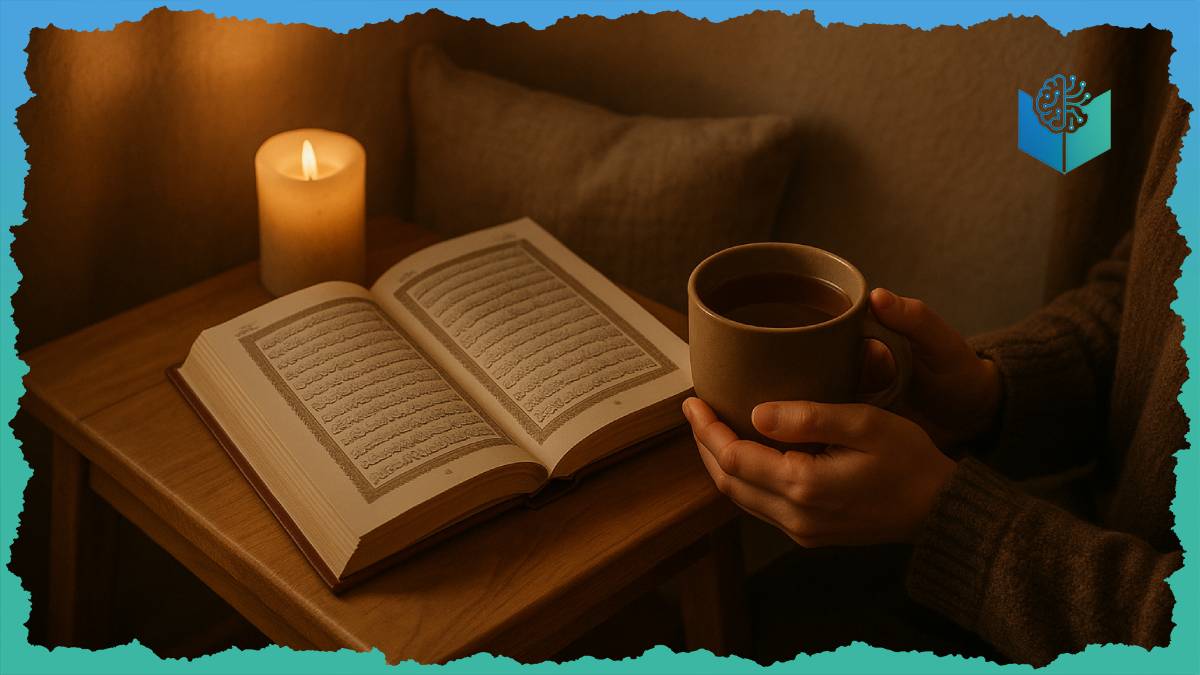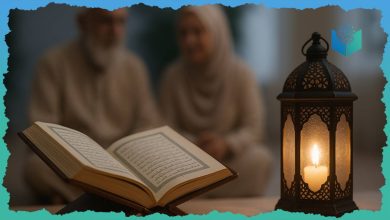The Role of the Quran in Daily Muslim Life

The Quran is not just a book of scripture for Muslims; it’s a complete guide for life. It provides spiritual nourishment, moral clarity, and practical instruction for every moment of existence. From prayer to work, from relationships to social justice, The Role of the Quran in Daily Muslim Life reminds believers of their higher purpose and connection with Allah.
The Importance of the Quran in Daily Life
The importance of the Quran lies in its timeless message that transcends generations. Every verse offers divine wisdom that helps Muslims navigate both spiritual and worldly challenges. It is through regular recitation, reflection, and application that one truly understands its transformative power.
The Quran states: “Indeed, this Qur’an guides to that which is most just and upright.” (Quran 17:9). This verse alone summarizes why the Quran is central to daily Muslim life; it is a constant compass guiding toward justice, peace, and righteousness.
Understanding this, The Role of the Quran in Daily Muslim Life plays a pivotal role in shaping the values and actions of Muslims around the world.
Living by the Quran: Turning Knowledge into Action
Understanding the Quran is one thing, but living by the Quran is where true faith is tested. Islam teaches that faith must manifest through action. The Prophet Muhammad (peace be upon him) was described by his wife Aisha as “a walking Quran,” meaning his behavior was the living example of divine revelation.
When Muslims apply the Quran’s teachings, showing kindness, being honest in business, and forgiving others, they embody the faith. This practical approach transforms faith from theory into a Quranic lifestyle, where divine principles influence every decision.
How to Apply the Quran in Modern Life
Applying the Quran today doesn’t mean isolating oneself from the modern world; it means engaging with it ethically and spiritually. Whether at work, online, or at home, Muslims can find Quran guidance for every situation.
For example, in an age of constant distraction, the Quran teaches focus: “Indeed, in the remembrance of Allah do hearts find rest.” (Quran 13:28). In times of moral confusion, it urges integrity: “Stand out firmly for justice, as witnesses to Allah.” (Quran 4:135).
To truly apply the Quran, one must develop the habit of reflection, reading a few verses daily, seeking meaning, and acting upon them. Platforms like Ayaat help Muslims do this interactively and meaningfully by connecting verses to modern-day situations.

Quran as Daily Guidance for All Aspects of Life
The Quran not only addresses worship, but it also provides daily guidance for personal growth, family relationships, community ethics, and even mental well-being. It teaches balance between body and soul, faith and reason, action and reflection.
For instance, it encourages humility: “Do not walk upon the earth arrogantly.” (Quran 17:37). It promotes gratitude: “If you are grateful, I will surely increase you.” (Quran 14:7). Such reminders build emotional resilience and moral strength in everyday situations.
When one consistently applies these lessons, life becomes aligned with the Quranic lifestyle, leading to peace, contentment, and a deeper connection to Allah.
The Role of the Quran in Shaping Character
Character is the mirror of faith. The Quran molds personality through values like patience, sincerity, compassion, and courage. It warns against arrogance and hypocrisy while uplifting truthfulness and humility.
The Quran describes true believers as “those who are humble in their prayers and who avoid vain talk.” (Quran 23:2–3). These traits are not just for moments of worship; they define how one interacts in daily life, shaping ethical choices at every turn.
The Quran and Relationships in Daily Life
Relationships, whether with family, friends, or colleagues, are a central part of living by the Quran. The Quran encourages fairness, forgiveness, and empathy in human interactions.
“And speak to people good [words].” (Quran 2:83). With this simple command, the Quran transforms communication into an act of faith. Whether it’s showing respect to parents, maintaining honesty in friendships, or being kind to neighbors, these values help strengthen the moral fabric of society.

The Quran as a Source of Peace and Healing
One of the most beautiful aspects of the importance of the Quran is its role as a source of inner peace. In a world of stress and uncertainty, believers find comfort in Allah’s words: “We send down of the Qur’an that which is healing and mercy for the believers.” (Quran 17:82).
This healing is not just spiritual, it affects mental clarity and emotional balance. Daily recitation and contemplation can calm anxiety and strengthen faith, turning the Quran into a constant companion for the soul.
Quran Guidance for Work and Ethics
The Quran in daily life extends into professional and social ethics. It promotes fairness in trade, honesty in dealings, and accountability in leadership. In business, it forbids deceit and exploitation: “Give full measure and weight in justice.” (Quran 6:152).
By applying these principles, Muslims bring integrity to their careers and communities. Work becomes more than earning a livelihood; it becomes an act of worship when aligned with the Quran’s moral code.
How the Quran Encourages Social Responsibility
The Quran constantly calls believers to uplift others, care for the poor, and establish justice. Charity and compassion are recurring themes that form the foundation of social ethics in Islam.
“And they give food in spite of love for it to the needy, the orphan, and the captive.” (Quran 76:8). These acts reflect the Quranic lifestyle, reminding believers that their duty to Allah includes service to humanity.
The Quran and Modern Technology: New Ways to Connect
Today, Muslims can learn, reflect, and apply Quran guidance more easily than ever before. Technology has opened doors for global learning through apps, online tafsir, and AI-based Quranic study platforms like Ayaat, which offer interactive ways to connect divine wisdom with daily challenges.
While modern distractions can pull hearts away, these tools help believers maintain spiritual focus. Using technology to deepen one’s relationship with the Quran ensures that faith remains alive and practical in the digital age.
The Quran’s Teachings on Time and Productivity
The Quran emphasizes time as a sacred trust. It calls believers to use every moment wisely: “By time, indeed, mankind is in loss, except for those who believe and do righteous deeds.” (Quran 103:1–3).
Understanding this verse encourages Muslims to manage their lives productively, balancing worship, work, and rest. By following this Quranic guidance, believers cultivate discipline and gratitude in their routines.

Balancing Spiritual and Worldly Life Through the Quran
Islam teaches balance, not isolation. The Quran as daily guidance helps Muslims live spiritually while engaging productively with the world. It encourages modesty, contentment, and mindfulness without rejecting progress or ambition.
The Quran beautifully reminds: “Seek, through what Allah has given you, the home of the Hereafter; and yet, do not forget your share of the world.” (Quran 28:77). This balanced view fosters a peaceful coexistence of faith and modern life.
How the Quran Builds Resilience and Patience
Life brings trials, but the Quran provides strength to endure them. Patience (sabr) is a recurring theme that teaches emotional control and trust in divine wisdom.
“Indeed, Allah is with the patient.” (Quran 2:153). With this reassurance, Muslims learn to view hardships as opportunities for growth. The Quran turns adversity into spiritual elevation, guiding believers to rely on Allah’s mercy during difficult times.
Teaching the Next Generation to Live by the Quran
Parents play a vital role in helping children experience the Quran in daily life. Teaching kids to recite, reflect, and act upon Quranic values shapes their moral compass early.
By incorporating the Quranic lifestyle at home through stories, discussions, and family recitation, faith becomes a natural part of everyday life. The Quran says: “And command your family to pray and be steadfast therein.” (Quran 20:132). These habits build future generations who live by faith and purpose.
The Quran’s Vision of a Just and Peaceful Society
Justice and equality lie at the heart of Quranic teachings. It commands fairness to all, regardless of race or status: “O mankind, indeed We have created you from male and female and made you peoples and tribes that you may know one another.” (Quran 49:13).
By promoting compassion, equality, and ethical living, the Quran lays the groundwork for a society built on dignity and mutual respect. Such values remain as relevant today as they were 1400 years ago.
How to Build a Quran-Centered Routine
To integrate the importance of the Quran into daily life, small and consistent steps matter most:
- Read a few verses after each prayer.
- Reflect on one verse per day and apply its meaning.
- Keep reminders of Quranic ethics in work and relationships.
- Use platforms like Ayaat to access Quranic reflections and meanings easily.
These habits turn ordinary days into acts of remembrance and gratitude, making the Quran a living presence in one’s schedule.
Conclusion
The Quran in daily life is more than recitation; it’s reflection, action, and transformation. By living by the Quran, believers align their lives with divine guidance in every sphere: family, work, community, and personal growth.
In every verse, the Quran offers timeless solutions for modern challenges, urging balance, justice, and compassion. Tools like Ayaat make it easier than ever to connect with these teachings and live a truly Quranic lifestyle. When the Quran becomes the center of life, it brings peace to the heart, clarity to the mind, and purpose to the soul.
Q&A
How is the Quran used in daily life?
The Quran guides Muslims in their morals, decisions, and relationships, serving as a daily reference for how to live with faith and righteousness.
How to apply the Quran in your life?
You can apply the Quran by understanding its meanings, practicing its teachings in behavior and worship, and reflecting on its verses in everyday actions.
How to read the Quran daily?
Set aside a specific time each day, even a few minutes, to recite and reflect on the Quran’s verses with understanding and consistency.





